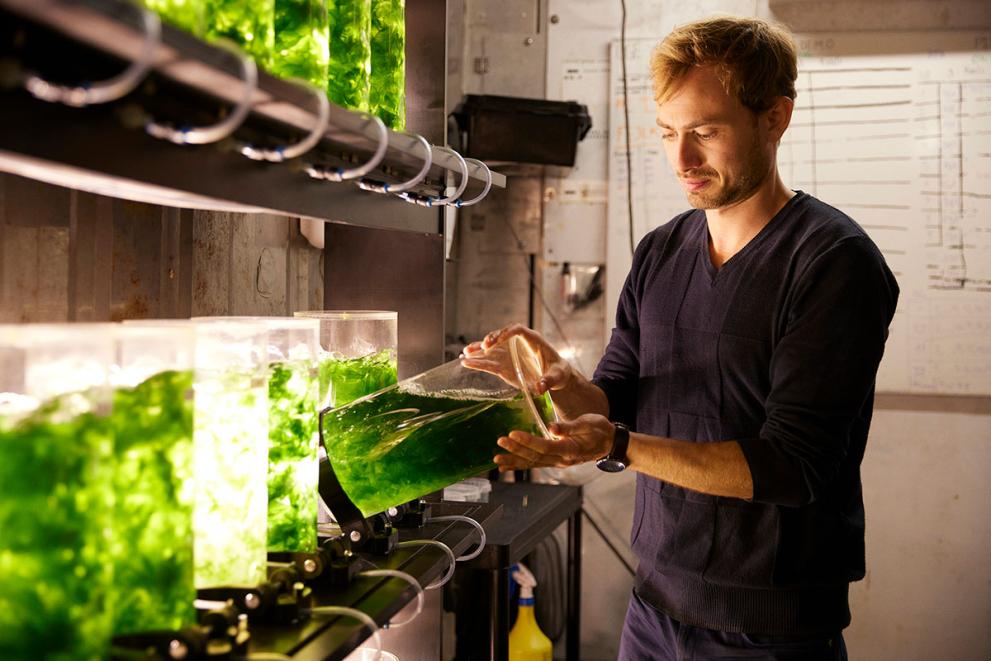
Yes you can! Pure Algae, a small innovative Danish business, has developed a sustainable land-based algae and seaweed cultivation system. Even better, this system can be installed alongside land-based aquaculture activities, using the nutrients produced to grow algae.
What’s behind this idea?
Nutrient flows from land to sea are contributing to the so-called eutrophication – where the marine environment becomes overly enriched with nutrients, leading to increased plant and algae growth. This can result in harmful algae blooms and dead zones, and consequently the loss of biodiversity.
Thanks to the European Maritime and Fisheries Fund (EMFF), and the Fisheries Local Action Group in the area, Pure Algae was able to start its business, build its sustainable seaweed solution and create jobs.
Esben Christiansen, Founder and CEO of Pure Algae, shares his vision:
'In a world facing critical environmental and population challenges, Pure Algae's sustainable and regenerative technology is not just innovative, it is essential for securing our future food supply.'
Innovations in aquaculture
Land-based seaweed cultivation is a relatively recent innovation in aquaculture and presents opportunities to tackle wastewater issues usually associated with land-based aquaculture fish production, which can contain CO2 and nitrogen compounds.
Pure Algae has developed seaweed cultivation systems that can be installed in land-based aquaculture fish production facilities. When installed, the cultivation systems allow CO2 emissions and excess nutrients, produced from the aquaculture activities, to be captured and used to grow macroalgae. As a result, wastewater is prevented from escaping into the environment and damaging marine ecosystems and is instead used to grow seaweed.
Pure Algae’s innovation focuses specifically on the vertical cultivation of Ulva – an opportunistic green macroalgae – in land-based recirculated aquaculture systems. Ulva was selected based on its rapid growth under favourable conditions, and its potential to generate large quantities of biomass with numerous uses, including human food, pharmaceuticals, and animal feed products.
Attracting interest and scaling up
European funding was crucial for the company in being able to attract investors to kick start the project and their operation. Funding was used to cover start-up needs from office furniture to complex technical equipment which allowed Pure Algae to establish their full-scale seaweed cultivation systems, and to demonstrate the commercial viability of combining seaweed and fish production.
Esben Christiansen, Founder and CEO of Pure Algae, explains:
'We are currently experiencing momentum in the market, with an opportunity to stand out from competitors and lead on market development.'
Breaking barriers and new horizons
Thanks to the Pure Algae project, scientists and industry have been brought together, and progress has been made towards a more circular bioeconomy. The production of high-quality seaweed, year-round in a controlled land-based facility, is the first of its kind in Denmark and has also attracted the interest of third-party sectors such as the pharmaceutical industry.
The developed technology has also been designed to be easily operated and has created job opportunities for those with reduced working capacities, or as they are known in Denmark, 'flex jobbers'. 'Flex jobbers' refers to individuals that cannot work regular jobs because of physical injury or other circumstances. Pure Algae currently hires three flex jobbers as part of its daily operations.
Overall, Pure Algae shows that sustainability focused production does not mean having to sacrifice economic outcomes, and that aquaculture waste can be used as feed for new and innovative production methods which can make food systems more sustainable.
More information
Video on the project: Pure Algae: a seaweed solution to reduce emissions (Long version)
Video: Pure Algae: a seaweed solution to reduce emissions (Short version)
Website on the project: PureAlgae
Social media: https://www.linkedin.com/company/pure-algae-dk/
Details
- Publication date
- 19 December 2024
- Author
- Directorate-General for Maritime Affairs and Fisheries

